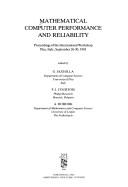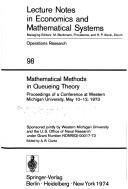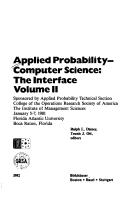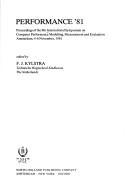| Listing 1 - 8 of 8 |
Sort by
|
Book
ISBN: 1932482350 9781932482355 Year: 2006 Publisher: Raleigh, N.C. Boson Books
Abstract | Keywords | Export | Availability | Bookmark
 Loading...
Loading...Choose an application
- Reference Manager
- EndNote
- RefWorks (Direct export to RefWorks)
The Markov Anniversary Meeting, June 12-14, 2006 was the fifth in a series of conferences devoted to the Numerical Solution of Markov Chains (NSMC). The prior four NSMC conferences were held in 1990, 1995, 1999, and 2003. The first two conferences were held in Raleigh, North Carolina, the third moved overseas to Zarazoga, Spain, and the fourth was held in Urbana-Champaign, Illinois. This fifth and most recent Markov meeting occurred sooner than the usual 4-5 year schedule in order to celebrate two very important events: the 150th anniversary of Andrei A. Markov's birth and the 100th anniversar

ISBN: 0444868925 9780444868923 Year: 1984 Publisher: Amsterdam North-Holland
Abstract | Keywords | Export | Availability | Bookmark
 Loading...
Loading...Choose an application
- Reference Manager
- EndNote
- RefWorks (Direct export to RefWorks)
Computer. Automation --- Electronic digital computers --- Computer networks --- Queuing theory --- Markov processes --- Numerical analysis --- Réseaux d'ordinateurs --- Markov, Processus de --- Analyse numérique --- Evaluation --- Mathematical models --- Congresses --- Reliability --- Congrès --- congresses --- Files d'attente, Théorie des --- Electronic digital computers - Evaluation - Mathematical models - Congresses --- Electronic digital computers - Reliability - Mathematical models - Congresses --- Computer networks - Congresses --- Queuing theory - congresses --- Markov processes - Congresses --- Numerical analysis - Congresses

ISBN: 3540067639 0387067639 3642808387 9783540067634 Year: 1974 Volume: 98 Publisher: Berlin Springer
Abstract | Keywords | Export | Availability | Bookmark
 Loading...
Loading...Choose an application
- Reference Manager
- EndNote
- RefWorks (Direct export to RefWorks)
On May 10-12, 1973 a Conference on Mathematical Methods in Graph Theory was held at Western Michigan University in Kalamazoo. The theme of this Conference was recent advances in the application of analytic and algebraic methods to the analysis of queues and queueing networks. In addition some discussion was given to statistical analy ses in queues, control problems and graphical methods. A total of 83 individuals from both industry and academic estab lishments participated in the Conference. A list of these partici pants can be found on page 373. A total of 18 papers were presented, with sUbstantial time being devoted to their informal discussion. This volume constitutes the proceedings of the Conference, and includes all papers presented. TABLE OF CONTENTS MARCEL F. NEUTS The Markov Renewal Branching Process • 1 RALPH L. DISNEY and W. PETER CHERRY Some Topics in Queueing Network Theory 23 JULIAN KEILSON Convexity and Complete Monotonicity in Queueing Distributions and Associated Limit Behavior . • • • • • . . • • • •• • • 45 G. F. NEWELL Graphical Representation of Queue Evolution for Multiple-Server Systems • . • • • • • • • • • • 63 N. U. PRABHU Wiener-Hopf Techniques in Queueing Theory 81 / IAJOS TAKACS Occupation Time Problems in the Theory of Queues 91 TAPAN P. BAGCHI and J. G. C. TEMPLETON Some Finite waiting Space Bulk Queueing Systems 133 U.
Stochastic processes --- Queuing theory --- congresses --- 519.872 --- Queuing theory. Service systems. Numerical simulation --- Mathematics --- Physical Sciences & Mathematics --- Mathematical Theory --- 519.872 Queuing theory. Service systems. Numerical simulation --- Files d'attente, Théorie des --- Congresses --- Congrès --- Files d'attente, Théorie des --- Congrès --- Recherche opérationnelle --- Congresses. --- Queuing theory - congresses --- Queueing theory
Book
ISBN: 0444854320 9780444854322 Year: 1981 Volume: 24 Publisher: Amsterdam North-Holland
Abstract | Keywords | Export | Availability | Bookmark
 Loading...
Loading...Choose an application
- Reference Manager
- EndNote
- RefWorks (Direct export to RefWorks)
Point processes --- Queuing theory --- Congresses --- 519.219 --- -Queuing theory --- -Erlang traffic formula --- Queueing theory --- Theory of queues --- Waiting-line theory --- Production scheduling --- Stochastic processes --- Processes, Point --- Random functions of several variables --- -Random functions of several variables --- 519.219 Random functions of several variables --- Files d'attente, Théorie des --- Congrès --- Files d'attente, Théorie des --- Congrès --- Point processes - Congresses --- Queuing theory - Congresses

ISBN: 3764330678 3764330937 9783764330934 9783764330675 Year: 1982 Volume: 2-3 Publisher: Boston Birkhäuser
Abstract | Keywords | Export | Availability | Bookmark
 Loading...
Loading...Choose an application
- Reference Manager
- EndNote
- RefWorks (Direct export to RefWorks)
Electronic data processing --- Computer programming --- Probabilities --- Queuing theory --- Informatique --- Programmation (Informatique) --- Probabilités --- Congresses --- Congrès --- congresses --- 681.3*G3 --- 519.2 --- -Probabilities --- -Queuing theory --- -Computer programming --- -681.3*A0 --- Computers --- Electronic computer programming --- Electronic digital computers --- Programming (Electronic computers) --- Coding theory --- Erlang traffic formula --- Queueing theory --- Theory of queues --- Waiting-line theory --- Production scheduling --- Stochastic processes --- Probability --- Statistical inference --- Combinations --- Mathematics --- Chance --- Least squares --- Mathematical statistics --- Risk --- ADP (Data processing) --- Automatic data processing --- Data processing --- EDP (Data processing) --- IDP (Data processing) --- Integrated data processing --- Office practice --- Probability and statistics: probabilistic algorithms (including Monte Carlo);random number generation; statistical computing; statistical software (Mathematics of computing) --- Probability. Mathematical statistics --- General --- Programming --- Automation --- 681.3*A0 --- 681.3*A0 General --- 519.2 Probability. Mathematical statistics --- 681.3*G3 Probability and statistics: probabilistic algorithms (including Monte Carlo);random number generation; statistical computing; statistical software (Mathematics of computing) --- Files d'attente, Théorie des --- Electronic data processing - Congresses --- Computer programming - Congresses --- Probabilities - Congresses --- Queuing theory - congresses --- -Congresses
Book
ISBN: 1447158733 1849965242 9786612982026 1849965250 1282982028 Year: 2010 Publisher: London ; New York : Springer,
Abstract | Keywords | Export | Availability | Bookmark
 Loading...
Loading...Choose an application
- Reference Manager
- EndNote
- RefWorks (Direct export to RefWorks)
Rapid Modelling and Quick Response is a proceedings volume of selected papers presented at the Second Rapid Modelling Conference “Quick Response – Intersection of Theory and Practice” presents new research developments, as well as business/teaching cases in the field of rapid modelling and quick response linked with performance improvements (based on lead time reduction, etc., as well as financial performance measures). This volume is a sequel to the First Rapid Modelling Conference proceedings volume that focused on rapid modelling for increasing competitiveness. The main focus of this second proceedings volume “Rapid Modelling and Quick Response – Intersection of Theory and Practice” is the transfer of knowledge from theory to practice, providing the theoretical foundations for successful performance improvement. Furthermore, illustrations will be given by teaching/business cases, as well as by success stories about new software tools in this field, and new approaches. The interested reader (researcher, as well as practitioner) will gain a good overview on new developments in this field. This conference volume is a must-have for innovative production managers, as well as for managers of service-providing processes. The theoretical, as well as the empirical/practical, pieces of work presented will change the mindset of the interested reader. Rapid Modelling and Quick Response will also contribute to the scientific communities of operations management, production management, supply chain management, industrial engineering and operations research. This volume and the presented research work, teaching/business cases, as well as software tools, can be also used for the education of students and executive managers. Rapid Modelling and Quick Response is supported by the SEVENTH FRAMEWORK PROGRAMME - THE PEOPLE PROGRAMME - Industry-Academia Partnerships and Pathways Project (No. 217891) “How revolutionary queuing based modelling software helps keeping jobs in Europe. The creation of a lead time reduction software that increases industry competitiveness and supports academic research.".
Flexible manufacturing systems -- Congresses. --- Industrial efficiency -- Mathematical models -- Congresses. --- Queuing theory -- Congresses. --- Manufacturing processes --- Civil & Environmental Engineering --- Engineering & Applied Sciences --- Civil Engineering --- Production engineering --- Mathematical models --- Engineering. --- Operations research. --- Decision making. --- Computer simulation. --- Management science. --- Engineering economics. --- Engineering economy. --- Engineering Economics, Organization, Logistics, Marketing. --- Engineering, general. --- Operation Research/Decision Theory. --- Simulation and Modeling. --- Operations Research, Management Science. --- Operations Research/Decision Theory. --- Construction --- Industrial arts --- Technology --- Economy, Engineering --- Engineering economics --- Industrial engineering --- Computer modeling --- Computer models --- Modeling, Computer --- Models, Computer --- Simulation, Computer --- Electromechanical analogies --- Simulation methods --- Model-integrated computing --- Operational analysis --- Operational research --- Management science --- Research --- System theory --- Quantitative business analysis --- Management --- Problem solving --- Operations research --- Statistical decision --- Deciding --- Decision (Psychology) --- Decision analysis --- Decision processes --- Making decisions --- Management decisions --- Choice (Psychology) --- Decision making
Book
ISBN: 1849968519 1848827474 9786612332876 1615832262 1282332872 1848827482 Year: 2009 Publisher: Amsterdam ; New York : Springer,
Abstract | Keywords | Export | Availability | Bookmark
 Loading...
Loading...Choose an application
- Reference Manager
- EndNote
- RefWorks (Direct export to RefWorks)
This proceedings volume of selected papers presented at the 1st Rapid Modelling Conference "Increasing Competitiveness – Tools and Mindset" gives a state-of-the-art overview of current research and new developments in the field of rapid modelling linked with lead time reduction. Rapid Modelling is generally based on queuing theory, but other mathematical modelling techniques are of interest, as are simulation models to facilitate the transfer of knowledge from theory to application, providing the theoretical foundations for successful lead time reduction. The interested reader (researcher as well as practitioner) should have a good overview of current activity in this field. Rapid Modelling for Increasing Competitiveness suggests that companies which are equipped for speed, with innovative processes, will outperform their slower competitors in many industries. Furthermore, this work also contributes to the scientific fields of operations management, production management, supply chain management, industrial engineering and operations research. The research papers presented in this book can be used to support the exchange of knowledge – between researchers, as well as practitioners – on the subject of increasing competitiveness through speed. Rapid Modelling for Increasing Competitiveness is supported by the EU Seventh Framework Programme – The People Programme – Industry-Academia Partnerships and Pathways Project (No. 217891) "How revolutionary queuing based modelling software helps keeping jobs in Europe. The creation of a lead time reduction software that increases industry competitiveness and supports academic research.".
Flexible manufacturing systems --Congresses. --- Industrial efficiency --Mathematical models --Congresses. --- Queuing theory --Congresses. --- Flexible manufacturing systems --- Queuing theory --- Industrial efficiency --- Civil Engineering --- Operations Research --- Industrial & Management Engineering --- Mechanical Engineering --- Civil & Environmental Engineering --- Engineering & Applied Sciences --- Mathematical models --- Production engineering --- Computer integrated manufacturing systems --- Manufacturing processes --- Industrial engineering --- Automation --- Manufacturing engineering --- Process engineering --- Engineering. --- Operations research. --- Decision making. --- Computer simulation. --- Management science. --- Engineering economics. --- Engineering economy. --- Engineering Economics, Organization, Logistics, Marketing. --- Operation Research/Decision Theory. --- Simulation and Modeling. --- Operations Research, Management Science. --- Mechanical engineering --- Operations Research/Decision Theory. --- Computer modeling --- Computer models --- Modeling, Computer --- Models, Computer --- Simulation, Computer --- Electromechanical analogies --- Simulation methods --- Model-integrated computing --- Operational analysis --- Operational research --- Management science --- Research --- System theory --- Economy, Engineering --- Engineering economics --- Quantitative business analysis --- Management --- Problem solving --- Operations research --- Statistical decision --- Deciding --- Decision (Psychology) --- Decision analysis --- Decision processes --- Making decisions --- Management decisions --- Choice (Psychology) --- Decision making


ISBN: 0444863303 9780444863300 Year: 1981 Publisher: Amsterdam : North-Holland,
Abstract | Keywords | Export | Availability | Bookmark
 Loading...
Loading...Choose an application
- Reference Manager
- EndNote
- RefWorks (Direct export to RefWorks)
Electronic digital computers --- Queuing theory --- Electronic data processing --- Evaluation --- Congresses --- congresses --- Distributed processing --- 681.3*H --- -Queuing theory --- -Electronic data processing --- -681.3*A0 --- 681.3*B44 --- 681.3*C4 --- ADP (Data processing) --- Automatic data processing --- Data processing --- EDP (Data processing) --- IDP (Data processing) --- Integrated data processing --- Computers --- Office practice --- Erlang traffic formula --- Queueing theory --- Theory of queues --- Waiting-line theory --- Production scheduling --- Stochastic processes --- Automatic digital computers --- Computers, Electronic digital --- Digital computers, Electronic --- Hybrid computers --- Sequential machine theory --- Information systems --- -Congresses --- General --- Performance analysis and design aids: formal models; simulation; verification; worst-case analysis (Input/output and data communications) --- Performance of systems (Computer systems organization) --- Automation --- 681.3*C4 Performance of systems (Computer systems organization) --- 681.3*B44 Performance analysis and design aids: formal models; simulation; verification; worst-case analysis (Input/output and data communications) --- 681.3*A0 General --- 681.3*H Information systems --- 681.3*A0 --- Distributed processing&delete& --- Evaluation&delete& --- Electronic digital computers - Evaluation - Congresses --- Queuing theory - Congresses --- Electronic data processing - Distributed processing - Congresses
| Listing 1 - 8 of 8 |
Sort by
|

 Search
Search Feedback
Feedback About UniCat
About UniCat  Help
Help News
News